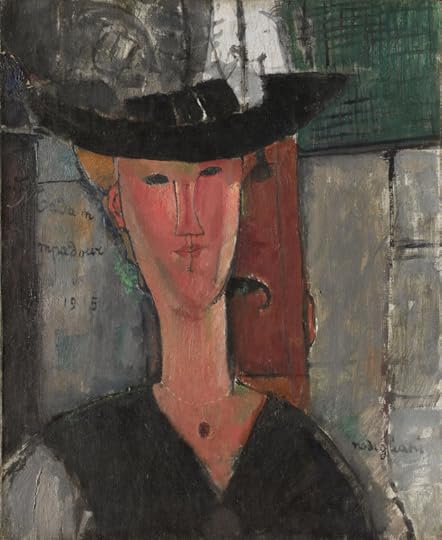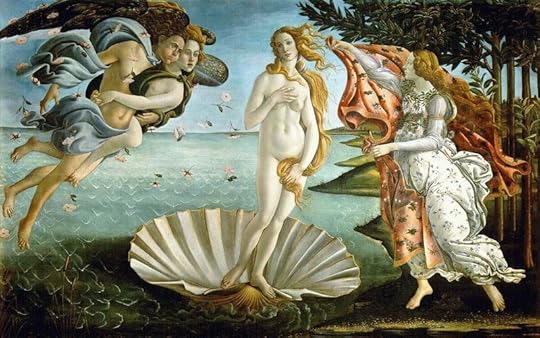 ReemK10 (Paper Pills)’s
Comments
(group member since Dec 26, 2012)
ReemK10 (Paper Pills)’s
Comments
(group member since Dec 26, 2012)
ReemK10 (Paper Pills)’s
comments
from the The Year of Reading Proust group.
Showing 61-80 of 1,025
 Marcelita wrote: "From the New York Review of Books:
Marcelita wrote: "From the New York Review of Books:"Reading Proust: The Accidental Buddhist" by Pico Iyer.
http://www.nybooks.com/blogs/nyrblog/..."
Thank you for sharing this with us Marcelita!! I'm going to have to repurpose this into a tumblr entry! Merci!
 I keep posting in the wrong place. This belongs in this week's thread:
I keep posting in the wrong place. This belongs in this week's thread:... for whom the trifling physical exertion of looking over their shoulder was a welcome interruption to the torture of listening "religiously to the Kreutzer Sonata. (MKE 496)
The Violin Sonata No. 9 of Ludwig van Beethoven, commonly known as the Kreutzer Sonata, was published as Beethoven's Opus 47. It is known for its demanding violin part, unusual length (a typical performance lasts slightly less than 40 minutes), and emotional scope — while the first movement is predominantly furious, the second is meditative and the third joyous and exuberant.
http://www.youtube.com/watch?v=mixnMz...
 Elizabeth wrote: "Although I have read and reread Proust all my life, I somehow didn't read the last volume much...or parts of it. E.g. in last week's reading the Narrator mentions the "young Mme de Cambremer" by w..."
Elizabeth wrote: "Although I have read and reread Proust all my life, I somehow didn't read the last volume much...or parts of it. E.g. in last week's reading the Narrator mentions the "young Mme de Cambremer" by w..."Elizabeth! You're like the grinch who stole Christmas. Keep reading young lady! You will finish this time. This volume is jam packed with goodies! I intend to reread it as soon as I finish!
 I found something that I'm having a hard time doing a copy and paste, so I will rewrite it:
I found something that I'm having a hard time doing a copy and paste, so I will rewrite it:Now, if there is an insecurity or anxiety associated with travel, it is that insecurity associated with the menace of irreparable loss. This loss can affect not only one's very life or sanity. Or one can simply lose one's way, since the possibility of there being no return is always implied in travel. Every voyage is potentially a voyage into exile, a voyage to the " end of the night." La Fontaine's famous fable " The Two Pigeons" provides an eloquent statement of this negative notion of travel. In this satire of the urge to travel, one of the two pigeons , "crazy enough to undertake/ a voyage to some faraway land," suffers one disaster after another in his journey until, " half dead and half limping," he decides to return home," from Travel as Metaphor
Just perfect for the ending of this book!
 Sorry, can't resist posting
Sorry, can't resist posting this: The Morality of the Fables of La Fontaine
http://ecommons.luc.edu/cgi/viewconte...
 The Two Doves
The Two Doves Wright, Elizur (1804 - 1885).
1 Two doves once cherish'd for each other
2 The love that brother hath for brother.
3 But one, of scenes domestic tiring,
4 To see the foreign world aspiring,
5 Was fool enough to undertake
6 A journey long, o'er land and lake.
7 What plan is this?' the other cried;
8 Wouldst quit so soon thy brother's side?
9 This absence is the worst of ills;
10 Thy heart may bear, but me it kills.
11 Pray, let the dangers, toil, and care,
12 Of which all travellers tell,
13 Your courage somewhat quell.
14 Still, if the season later were--
15 O wait the zephyrs!--hasten not--
16 Just now the raven, on his oak,
17 In hoarser tones than usual spoke.
18 My heart forebodes the saddest lot,--
19 The falcons, nets--Alas, it rains!
20 My brother, are thy wants supplied--
21 Provisions, shelter, pocket-guide,
22 And all that unto health pertains?'
23 These words occasion'd some demur
24 In our imprudent traveller.
25 But restless curiosity
26 Prevail'd at last; and so said he,--
27 The matter is not worth a sigh;
28 Three days, at most, will satisfy,
29 And then, returning, I shall tell
30 You all the wonders that befell,--
31 With scenes enchanting and sublime
32 Shall sweeten all our coming time.
33 Who seeth nought, hath nought to say.
34 My travel's course, from day to day,
35 Will be the source of great delight.
36 A store of tales I shall relate,--
37 Say there I lodged at such a date,
38 And saw there such and such a sight.
39 You'll think it all occurr'd to you.--'
40 On this, both, weeping, bade adieu.
41 Away the lonely wanderer flew.--
42 A thunder-cloud began to lower;
43 He sought, as shelter from the shower,
44 The only tree that graced the plain,
45 Whose leaves ill turn'd the pelting rain.
46 The sky once more serene above,
47 On flew our drench'd and dripping dove,
48 And dried his plumage as he could.
49 Next, on the borders of a wood,
50 He spied some scatter'd grains of wheat,
51 Which one, he thought, might safely eat;
52 For there another dove he saw.--
53 He felt the snare around him draw!
54 This wheat was but a treacherous bait
55 To lure poor pigeons to their fate.
56 The snare had been so long in use,
57 With beak and wings he struggled loose:
58 Some feathers perish'd while it stuck;
59 But, what was worst in point of luck,
60 A hawk, the cruellest of foes,
61 Perceived him clearly as he rose,
62 Off dragging, like a runaway,
63 A piece of string. The bird of prey
64 Had bound him, in a moment more,
65 Much faster than he was before,
66 But from the clouds an eagle came,
67 And made the hawk himself his game.
68 By war of robbers profiting,
69 The dove for safety plied the wing,
70 And, lighting on a ruin'd wall,
71 Believed his dangers ended all.
72 A roguish boy had there a sling,
73 (Age pitiless!
74 We must confess,)
75 And, by a most unlucky fling,
76 Half kill'd our hapless dove;
77 Who now, no more in love
78 With foreign travelling,
79 And lame in leg and wing,
80 Straight homeward urged his crippled flight,
81 Fatigued, but glad, arrived at night,
82 In truly sad and piteous plight.
83The doves rejoin'd, I leave you all to say,
84 What pleasure might their pains repay.
85 Ah, happy lovers, would you roam?--
86 Pray, let it not be far from home.
87 To each the other ought to be
88 A world of beauty ever new;
89 In each the other ought to see
90 The whole of what is good and true.
91 Myself have loved; nor would I then,
92 For all the wealth of crowned men,
93 Or arch celestial, paved with gold,
94 The presence of those woods have sold,
95 And fields, and banks, and hillocks, which
96 Were by the joyful steps made rich,
97 And smiled beneath the charming eyes
98 Of her who made my heart a prize--
99 To whom I pledged it, nothing loath,
100 And seal'd the pledge with virgin oath.
101Ah, when will time such moments bring again?
102To me are sweet and charming objects vain--
103My soul forsaking to its restless mood?
104 O, did my wither'd heart but dare
105 To kindle for the bright and good,
106 Should not I find the charm still there?
107 Is love, to me, with things that were?
 Kalliope, thank you for this spread of information you've compiled. Here is a you tube of the song:Charles Aznavour - Les Deux Pigeons
Kalliope, thank you for this spread of information you've compiled. Here is a you tube of the song:Charles Aznavour - Les Deux Pigeons https://www.youtube.com/watch?v=Jsi9G...
 Kalliope wrote:
Kalliope wrote: I should have waited one more week... but had an evening to spend and entertain my mom...
Good for you! I remember reading that you said that she enjoyed the film.
 I tweeted this link to our Eugene. It turns out she buys her Saxon Merino wool from him!!
I tweeted this link to our Eugene. It turns out she buys her Saxon Merino wool from him!!http://modernfarmer.com/2013/12/every...
 The Baron Charlus is the example for the vanity of love, he who in younger years participated in all sorts of masochistical practices, chained to matter like Prometheus to his rock, Czapski writes, he ends up old and senile, can't walked anymore yet is gently being cared for by Jupien who is the only one who stays with Charlus. Albertine of course has to be mentioned, and the story related to her Czapski calls one scream of despair and a ruthless exploration of jealousy. However, Czapski notes how Proust as someone who has loved so much in the end speaks so desinterested, noninvolved about love. He says in the end love is useful, a useful thing against the glamorous and numbing distractions of society which can be so harmful for the writer. Better have a bit of sensual love as antidote, so Proust. And this is an important contrast to the complete damnation of everything sensual of someone like Pascal. A bit of sensual love also, for Proust did not want to be like this horse in the ancient times that was only fed on roses. According to him, the artist has to be lonely, does not have to have disciples or followers for they weaken the artist. Czapski says that Proust only allows (accepts a tiny little bit, writes Czapski) some sensual love for his views on love are so pessimistic that they only lead to some heightened awareness of loneliness and cut precious wounds.
The Baron Charlus is the example for the vanity of love, he who in younger years participated in all sorts of masochistical practices, chained to matter like Prometheus to his rock, Czapski writes, he ends up old and senile, can't walked anymore yet is gently being cared for by Jupien who is the only one who stays with Charlus. Albertine of course has to be mentioned, and the story related to her Czapski calls one scream of despair and a ruthless exploration of jealousy. However, Czapski notes how Proust as someone who has loved so much in the end speaks so desinterested, noninvolved about love. He says in the end love is useful, a useful thing against the glamorous and numbing distractions of society which can be so harmful for the writer. Better have a bit of sensual love as antidote, so Proust. And this is an important contrast to the complete damnation of everything sensual of someone like Pascal. A bit of sensual love also, for Proust did not want to be like this horse in the ancient times that was only fed on roses. According to him, the artist has to be lonely, does not have to have disciples or followers for they weaken the artist. Czapski says that Proust only allows (accepts a tiny little bit, writes Czapski) some sensual love for his views on love are so pessimistic that they only lead to some heightened awareness of loneliness and cut precious wounds.
 Marcelita wrote: "Kalliope wrote: "Anybody knows which horse fed on only roses?"
Marcelita wrote: "Kalliope wrote: "Anybody knows which horse fed on only roses?"At first I thought...maybe someone in the Jockey Club fed his horse roses, but then Reems's find placed it in the far-past.
"...Prou..."
Oh I deleted that last post, much too long.
My best bet is that it was Incitatus, the favored horse of Roman emperor Caligula who was fed oats mixed with gold flake. Couldn't find anything about roses, but he was a pampered horse.Incitatus had a stable of marble, with an ivory manger, purple blankets, and a collar of precious stones.
 Kalliope wrote: "ReemK10 (Paper Pills) wrote: "I posted this in the wrong lounge! lol
Kalliope wrote: "ReemK10 (Paper Pills) wrote: "I posted this in the wrong lounge! lolhttp://www.nytimes.com/books/first/s/...
which I googled after reading the review for:The Unleashed Mi..."
Here it is again:
http://www.nytimes.com/books/first/s/...
 I posted this in the wrong lounge! lol
I posted this in the wrong lounge! lolReposting here:
I'm currently reading: Proust's Way
http://www.nytimes.com/books/first/s/...
which I googled after reading the review for:The Unleashed Mind: Why Creative People Are Eccentric
 Ce Ce wrote:I am delighted to be caught up and reading the last section with you this last week of the YORP.
Ce Ce wrote:I am delighted to be caught up and reading the last section with you this last week of the YORP.Way to go Ce Ce! I too, just finished this week's section which has put me in a melancholic mood.
Regarding the links I share, I have to say that I almost always forget how hesitant so many of you are to reading secondary sources or outside reflections, and prefer depending on your own. For me, as a reader, I am always ready to entertain an informed opinion. Different strokes for different folks. I just feel like saying, you may be missing something.... and I hate for you to miss out.
 I think Beatrice Hastings was the descendent and not Fernande Olivier:
I think Beatrice Hastings was the descendent and not Fernande Olivier:http://modernartconsulting.ru/en/2013...
 Throwing this out there... Could Proust have been referring to Modigliani and this painting?
Throwing this out there... Could Proust have been referring to Modigliani and this painting?
In the "Madame Pompadour - Portrait of Beatrice Hastings," Modigliani rendered 'Cubism' by simultaneously depicting the sides of the face through different viewpoints, as well as having a collage effect with the writings on stonewall.
Article Source: http://EzineArticles.com/2341225
Amedeo Modigliani
Italian, 1884–1920
Madam Pompadour, 1915
Oil on canvas
24 1/16 x 19 3/4 in. (61.1 x 50.2 cm)
Signed, l.r.: "modigliani"; inscribed and dated, l.c.: "Madam/Pompadour/1915"
Joseph Winterbotham Collection, 1938.217
http://ezinearticles.com/?His-Most-Fa...
Modigliani was exhibiting, trying to sell his work, and looking for a dealer. No longer was the Salon, that fortress of the artistic establishment, the only place an artist could exhibit, or even the Salon des Réfusés, established by the Impressionists in the 1860s. Now there was the Salon des Indépendants, established by such artists as Georges Seurat, Odilon Redon, and Paul Signac. And there was yet another anti-establishment venue, the Salon d’Automne. The creation of a prominent architect and writer, Fritz Jourdain, the Salon d’Automne attracted a socially prominent crowd when it opened its doors in October 1903. At the Petit Palais, Proust, in white tie and tails, mingled with the politician Léon Blum and the aristocratic Comtesse de Noailles. It was a success on every count and became at once a major goal of every young unknown. In 1907 the Salon accepted seven works by Modigliani: the portrait of his friend the German artist Ludwig Meidner, a Study of a Head, and five watercolors.
Modigliani was born into a Jewish family in Livorno, Italy. A port city, Livorno had long served as a refuge for those persecuted for their religion, and was home to a large Jewish community. His maternal great-great-grandfather, Solomon Garsin, had immigrated to Livorno in the 18th century as a refugee.[1]
Modigliani's mother (Eugénie Garsin), who was born and grew up in Marseille, was descended from an intellectual, scholarly family of Sephardic Jews, generations of whom had resided along the Mediterranean coastline. Her ancestors were learned people, fluent in many languages, known authorities on sacred Jewish texts, and founders of a school of Talmudic studies. Family legend traced the Garsins' lineage to the 17th-century Dutch philosopher Baruch Spinoza.
 Oh will you want to read this find!!!
Oh will you want to read this find!!!
It depicts the goddess Venus, having emerged from the sea as a fully grown woman, arriving at the sea-shore (which is related to the Venus Anadyomene motif.
[image error]
http://www.academia.edu/3277601/Prous...
http://amoleskine.tumblr.com/post/339...
@Manny and Kalliope, there is a very interesting reference to Kant.
This really ties together so many themes introduced and discussed by you all over the year! And so much more!No spoilers.
@ReemK10(PaperPills) BRAVO! lol Enjoy!
 Wonderful Marcelita! Enjoy!
Wonderful Marcelita! Enjoy!For Elizabeth, we want you to be on Jeopardy!!!:
A Book Brings Champions Together
By JOHN WILLIAMS
Two "Jeopardy!" winners, Tom Nissley and India Cooper, recently crossed paths over Nissley's trove of literary trivia and history, "A Reader's Book of Days."
http://www.nytimes.com/2013/12/22/boo...


